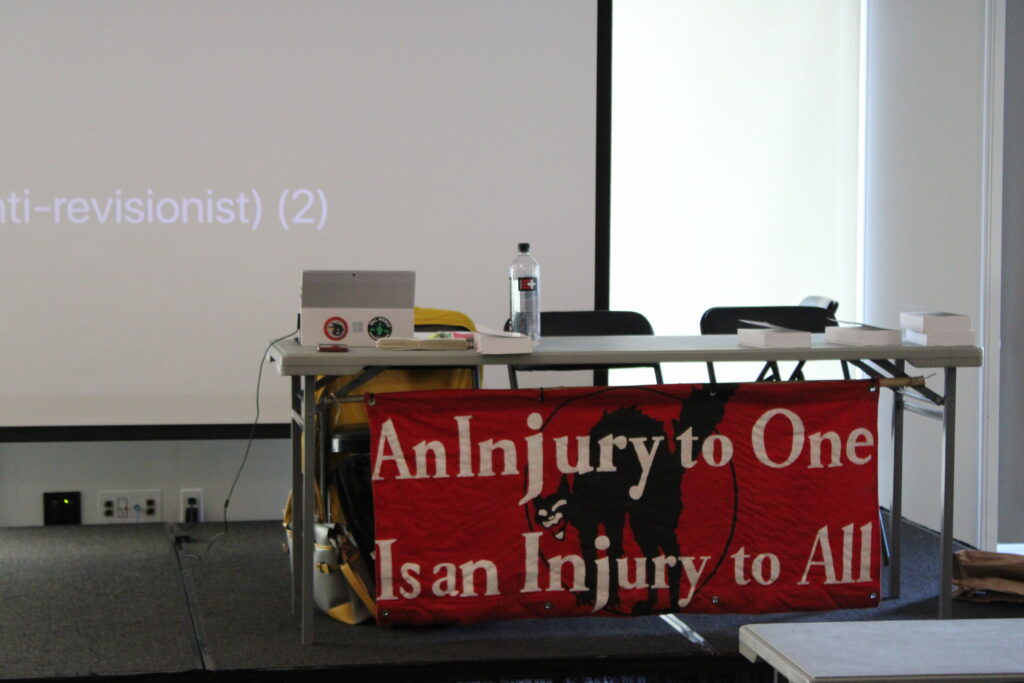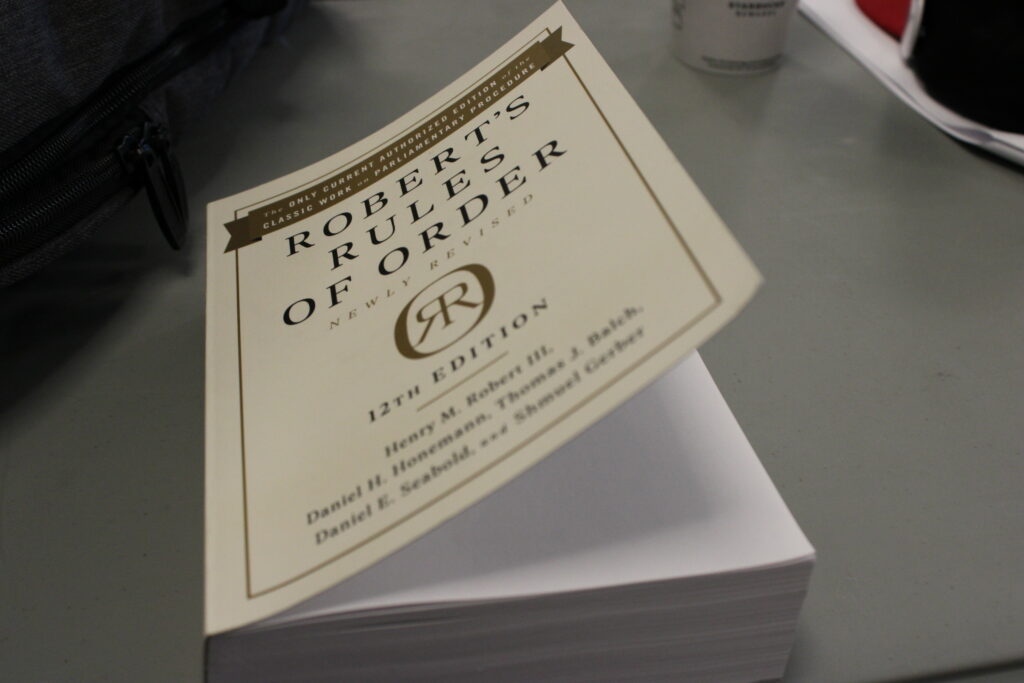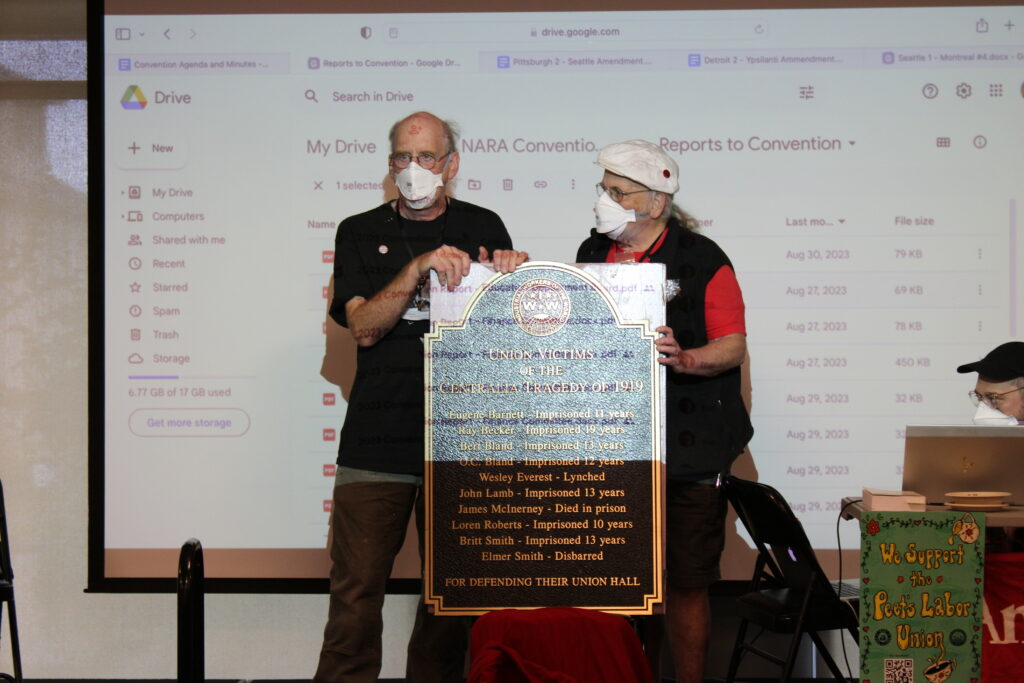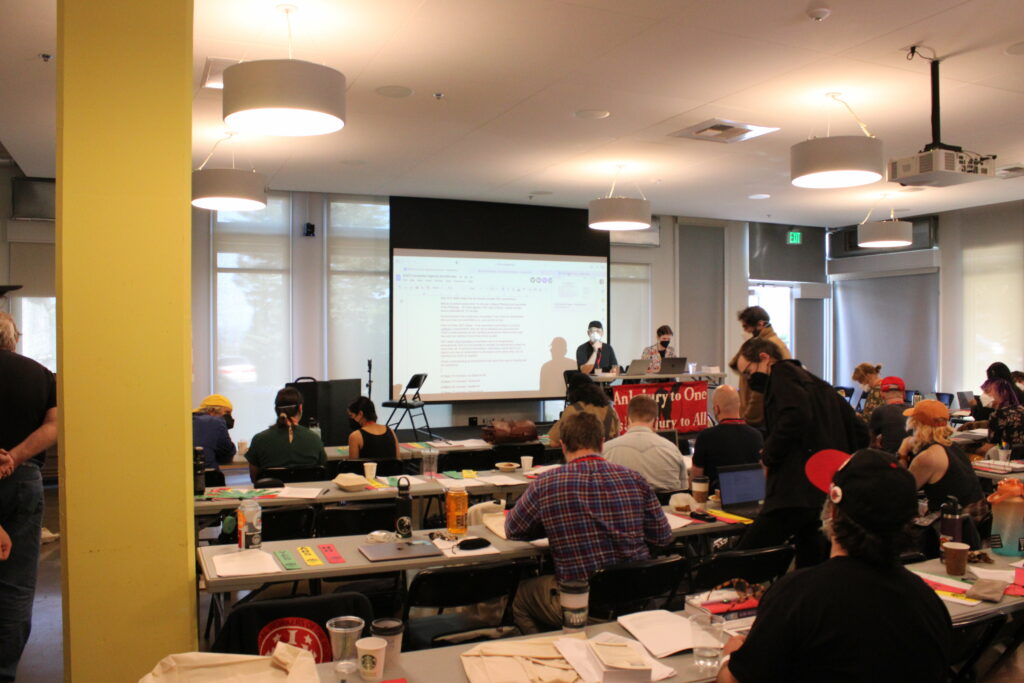
Stumbling, last minute, into the convention
SEATTLE, WA—The NARA convention of the year 2023 was… hard to describe.
At first when I heard about the previous year’s convention from a delegate of the Austin branch, it seemed uninteresting. Through his eyes, I saw a few of the politically charged and chaotic events of the 2022 online convention. I understood that the convention was a 3-day-long meeting full of Wobblies who try to make changes to the rules and structures of the IWW, nominate new officers, and hear reports from existing officers. It makes sense. It’s the logical way to democratically make decisions and improvements in a big union with many branches, departments and committees.
I also thought that it was a huge waste of time. I hadn’t read our constitution, and I didn’t care to check the verbose legalese of our bylaws, much less the resolutions of that year. I thought, surely, if so many people spent so much energy, time and creativity on a single workplace, we could unionize it in a day! At the time, I was involved in a campaign at my workplace, and highly focused on what I could do at the local level, for my coworkers and myself. The procedures and politics of the union at large didn’t impact my efforts in any visible way, and I swore never to waste my time impacting them, when there is so much work to do here, at my job.
I broke that promise in less than a year, and I’m very happy I did because NARA 2023 Convention changed my life.
Two weeks before the convention started, my branch met at a little co-op bookstore in downtown Austin to have our General Business Meeting. One of the topics of the day was to see if anyone would want to go to the convention as our delegate. I had every intention of letting someone else volunteer. We had a record number of fellow workers present at that meeting so someone would surely volunteer to delve into procedure and politics on our behalf. There were already enough tasks on my IWW plate as a workplace organizer, an external organizer, a trainer and an Organizing Department Liaison without adding a three day trip to the other side of the country.
Yet, through the course of the meeting, I realized: I could use this event to promote a video series project called “How to Fire your Boss” which aims to be educational IWW propaganda. Truly, there would be no better place to fulfill this than at a gathering of members from across Canada and the USA. I volunteered to go two days later.

NARA 2023
Two weeks later, I arrived in front of Seattle’s beautiful Centilia Cultural Center. I met dozens of fellow workers from all sorts of jobs, cities, backgrounds, and united in our love for the One Big Union. I exchanged contact information with many of them, just as planned. But beyond that, I also had deep meaningful conversations. I made new friends, and started what I believe to be lifelong relationships. We exchanged tips on creating engagement in our branches. We discussed cyber security, leftist unity, labor history, online versus in-person conventions, democracy, resolutions, amendments, and many more fascinating subjects.
I had the worst panic attack of my life, and found myself surrounded by helpful, gentle folks who helped me through it and after it.
I admired others developing their skills, and found myself learning alongside them. We collectively practiced public speaking, parliamentarian rules, patience, problem solving, empathy, patience, cooperation and patience.
And after all that, we would go grab a drink every night.
The convention did have its difficulties. Collectively, we walked into there with a barebones understanding of Robert’s Rules of Order, which slowed down the first day a lot. The rules are meant to simplify meetings and make them more efficient, but that requires all of the active participants to understand them. We did not start off with a good understanding. While we learned how those rules operated by watching one another, we made a lot of procedural mistakes. Delegates would call “point of order” for things that were really “points of privilege.” Some of us would lose track of what was being voted on and needed to have it re-explained. We even had to have a vote on whether or not to open the back door (check the meeting notes if you don’t believe me).
Those mistakes went well into the third day, but by then, we had found our pace. Importantly, there was never a sense of judgment when one of us made a mistake. No one seemed to hold it against me when I asked a question that was not “germane to the motion on the floor,” or seconded a motion suggested by the chair instead of saying “so moved.” I think that we understood quickly that such mistakes were part of the democratic process we used, and not the fault of the individual Wobblies who committed them. Yes, time was wasted, but it was time that we spent learning from mistakes. It was time we used to make ourselves better at meetings. We all watched one another grow and learn in those three days, and in a way I have only ever seen at Training for Trainers.
And all that was possible because we had a common cause. We all wanted to do what was best for the IWW, the working class, and the world. This goal united us through the most difficult times and made us push through the tedious hours of meeting.

The Tone Deaf Singer
Now, you might be asking yourself: “What does this have to do with singing?” To answer this question, I must take us back 25 years. I grew up in the south of France, in a middle-class family that did not foster the best environment for learning to sing.
My father had high expectations for his children when it came to learning. We were expected to come home with high grades and the praise of our teachers, whether it was from school or hobbies. If we were going to do something, anything, we could not do it casually: We had to do it with the goal of mastering it someday, and someday soon.
I remember my father lamenting that he had to pay for so many different hobbies I picked up over the years, instead of focusing on mastering just one. I never considered singing as the hobby for me. It was girlish at a time when I thought I was a boy. It was hard to tell when I did it right because my ears don’t work super well. It was something I would learn in school anyways. Why work on it now when I know it will be homework later? Why bother?
If you sang wrong in my childhood house, someone would tell you, often in a way that was discouraging. So, I never wanted to sing in public, afraid of facing the same ridicule that was common at home. I sang as part of my music class, and school concerts, but always making my voice smaller than the other kids, always worried that I would subtract from the sum of our parts.
Even today, I mumble my way through the prayers at Synagogue, relying on the big, talented, beautiful, voice of my wife to cover mine.
Twenty years later, at the convention, the conditions for singing were not ideal. At the end of the second day of grueling procedures and long arguments, we were scheduled to sing. Our throats were tired from speaking, often loudly so the whole room could hear. Our bodies were eager to go to sleep. Our minds were preoccupied by the resolutions and amendments. Many of us hadn’t read the lyrics, or listened to the tune beforehand. I hadn’t done either. I was going into this public display of my cantoral mediocrity with no preparation whatsoever.
Yet, when the first words of the song escaped my lips, none of that mattered. I was able to sing, just as loud, and just as confident as the fellow workers next to me. I was able to sing, unafraid of the judgment of people whose opinions I value a lot. I was able to sing, knowing full well that my timing was off, my tune was unrehearsed, my pitch was wrong, my words were struggling to be read for the first time, and my voice was sore.

Finale
So why was I finally able to sing serenely in public after all these years? Well, because it was what we had been doing for the past two days. In our own way, we had been singing the whole time. Our little chorus had gotten together with the goal of creating harmony. We came to the convention with varying levels of skill and experience, yet we helped one another without judging each other’s mistakes. We arrived with different intents, aspirations, and convictions that could have divided us, but we came together in solidarity. We had botched some rules, but our chair guided us through it like a maestro conducts an orchestra. The Seattle folks and the observers had worked hard to keep the convention running, reminding me of how the instrument players are essential to support a troupe. We carried the voices and votes of our fellow workers to the convention, with the shared intent of making some beautiful words ring true.
The words we had been working on were those of the resolutions, not really a song by the regular definition, but in the moment, that distinction didn’t matter.
The many procedural mistakes we made that day echoed in my ears. I knew no one would mind how I sang: No one had minded when a fellow worker had asked an off-topic question on the floor. What mattered is that we were all trying our best, together.
It was a liberating feeling of solidarity. The words of “There is a Power in a Union” are truly inspirational, and well suited to the occasion. They ring in my ears even now, even though I only heard them that one time. So too, do the words of “Solidarity Forever,” which we sang at the end of the third day.
When we did, I was able to sing, just as confidently, but my voice broke with emotion a few times. At the end of the song, the end of the convention, I cried in joy, in sadness, in solidarity.
I have not been able to sing since. And I don’t think I will until the next convention.
An IWW convention is a difficult, long, and tedious thing. But if you participate, you will find many hands to lift you up, many voices whispering encouraging words, many heads coming together to solve problems, and a harmony of solidarity, a song that never really leaves your ears. You will find a place to sing, together, about a better world.
I hope someday soon, I will be able to sing with you, fellow workers.
In solidarity,
Photos are by FW Porco Rossellini.

